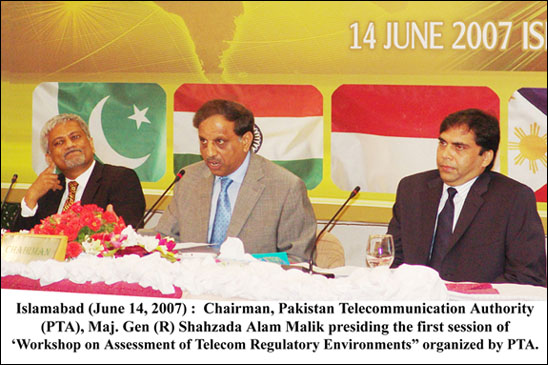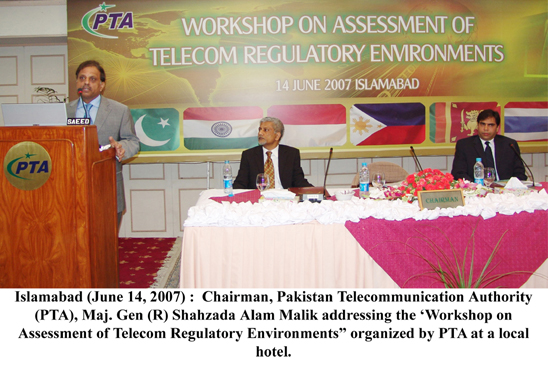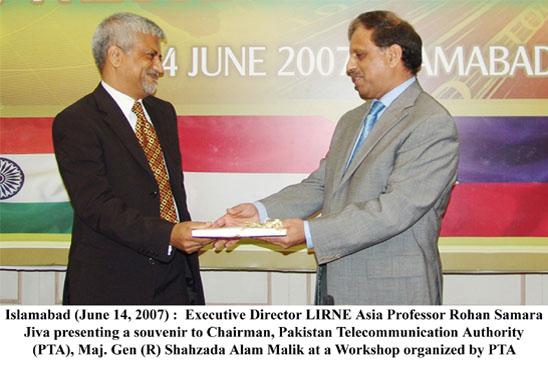Press Release
Pakistan Ahead of Regional Countries in Telecom Regulatory Environment

Islamabad: Pakistan has a better regulatory environment for mobile telecommunication than India, Indonesia, Sri Lanka and the Philippines. This has been revealed in the results of the first Telecom Regulatory Environment (TRE) Survey conducted in five Asian countries including Pakistan by Sri Lanka based independent telecom research organization LIRNEasia.
These results were presented today in a â??Workshop on Assessment of Telecom Regulatory Environmentsâ? organized by Pakistan Telecommunication Authority (PTA) in a local hotel. The workshop was inaugurated by Chairman PTA Maj. Gen. (Retd) Shahzada Alam Malik and was attended by senior executives of telecom sector, PTA officers and academicians.
Speaking on the occasion, the Chairman PTA said that independent researchers like GSMA & LIRNEasia are few names that motivate the regulators to perform even better every time. The survey that has been conducted by LIRNEasia will give us insight on our performance reflected in different areas of teleuse in the country. He said that PTA has provided level playing field to all operators during the course of liberalization. Now, there is competition in every telecom service segment in Pakistan, including fixed telephony, mobile cellular, Payphones, Internet and other value added services.
He said that the total teledensity reached 43.44 % in May 2007, which was just 12% in June 2005. On average approximately 2.3 million subscribers are being added on cellular mobile networks each month in Pakistan, which is an exemplary growth in relation to the population of any country in Asian region. He said that mobile penetration reached 37.6% at the end of April 2007. Total mobile subscribers at the end of May 2007 crossed the 60.8 million mark. He said that during the first three quarters of 2006-07, telecom sector attracted US$ 1.4 billion FDI. Telecom sector of Pakistan is growing at an astounding pace and surpassing all forecasts over the last few years, he added.
The results of the 2006 TRE survey, carried out in India, Indonesia, Pakistan, Philippines and Sri Lanka as part of a multi-component study, provide a useful diagnostic tool for assessing regulatory efficacy. Overall, Pakistan scored particularly well on market entry and on the management of scarce resources (spectrum) in mobile sector.
Pakistan and the Philippines emerged as having the best regulatory environments in mobile, with Pakistan marginally ahead. Pakistanâ??s performance was particularly impressive because it is the country with the lowest GNI per capita in the set. India had the next best scores, with Indonesia and Sri Lanka following. Pakistan scored higher than India on four out of the six dimensions in the mobile sector (market entry, management of scarce resources, interconnection, and universal service), with India being significantly ahead in tariff regulation, the study disclosed.
On the fixed sector TRE assessments, the Philippines topped the ratings, and Pakistan came in third, marginally behind India. However, Pakistan topped India on four of the six dimensions on fixed: management of scarce resources, interconnection, regulation of anticompetitive practices, and universal service.
Commenting on the results of the survey, LIRNEasia Executive Director and former Director General of Telecommunications of Sri Lanka, Professor Rohan Samarajiva said that â??Pakistan, which overtook both India and Sri Lanka in basic telecom measures (that is fixed plus mobile per 100 inhabitants) within the last two years, demonstrates that correct â??big-bangâ? reforms (that is, transparent and broad market entry, as well as privatization) followed by credible, effective implementation by a motivated regulatory agency can make a huge difference.â??
On this occasion, presentations were made by Executive Director LIRNE Asia Rohan Samra Jiva, Joseph Wilson from LUMS, Harsha de Silva, Tariq Sultan DG (CA) PTA while Member (Technical) PTA Dr. Muhammad Yaseen concluded the workshop.
It may be mentioned that LIRNEasia is a regional, non-profit ICT policy and regulation capacity-building organization. At present it is funded primarily by the International Development Research Centre of Canada.
Khurram Ali Mehran
Deputy Director (PR)




